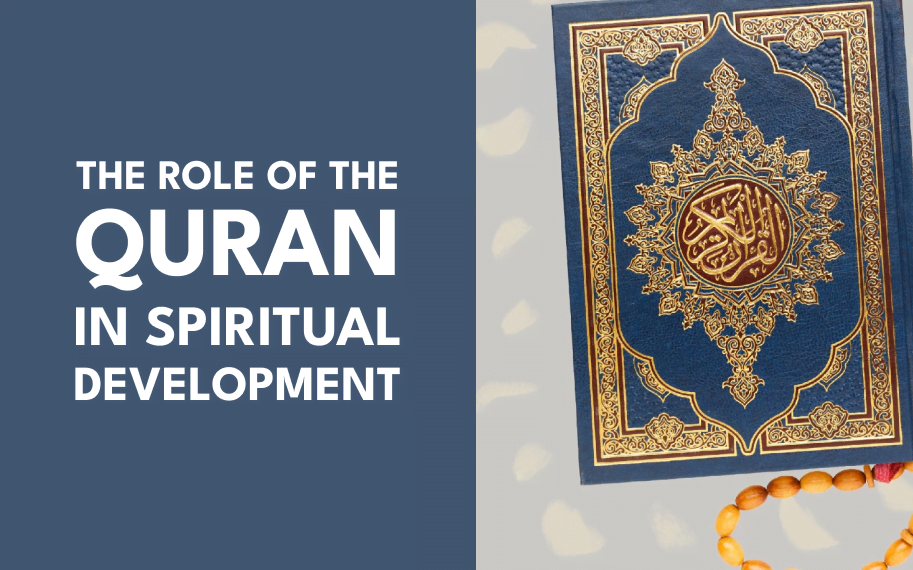
The Quran, the holy book of Islam, holds a central and profound role in the spiritual development of Muslims worldwide. It is not merely a religious text but a source of guidance, solace, and wisdom. Its verses are believed to be the literal word of God (Allah), and its influence on the lives of believers is immeasurable. In this blog, we will explore the multifaceted role of the Quran in nurturing the spiritual growth of individuals.
Table of Contents
Divine Guidance
The Quran is often described as the ultimate guide for human life. It provides clear and unambiguous guidance on how to live a righteous and ethical life. It outlines a moral framework, offering commandments and prohibitions, making it a moral compass for Muslims. By adhering to the Quranic principles, individuals aim to lead a life in accordance with the divine will, which is pivotal for their spiritual growth.
Spiritual Connection
Reciting and reflecting upon the Quran creates a profound spiritual connection between the believer and the divine. Muslims believe that the Quran is the literal word of God, and each verse is a direct message from Him. Engaging with the Quran through recitation, memorization, or contemplation is a way to strengthen this spiritual bond. It is not just a book; it is a direct channel to God.
Reflection and Contemplation
The Quran urges believers to reflect on the signs of God in the universe and within themselves. This process of deep contemplation and introspection is a significant component of spiritual development. It leads individuals to a better understanding of their purpose in life, fostering a closer relationship with God as they recognize His signs in the world around them.
Healing and Comfort
The Quran is also known for its healing properties. Many Muslims turn to its verses during times of distress, illness, or emotional turmoil. They believe in the Quran’s power to provide both physical and emotional healing. Recitation and listening to its soothing verses offer comfort, peace, and reassurance during life’s trials.
Increased Patience and Gratitude
The Quran teaches believers to be patient in the face of adversity and to be grateful for the blessings they receive. This cultivates a sense of patience and gratitude in individuals, enabling them to endure hardships with resilience and maintain a positive outlook on life.
Self-Improvement
The Quran encourages individuals to strive for self-improvement, both morally and spiritually. It serves as a guide for character development, motivating believers to overcome their shortcomings, exercise self-discipline, and work on their personal growth.
Community and Brotherhood
The Quran emphasizes the importance of a unified Muslim community and the concept of brotherhood among believers. This sense of community and belonging is a vital aspect of spiritual development. It fosters empathy, cooperation, and mutual support among Muslims, enriching their spiritual journey.
Prayer and Worship
The Quran is an integral part of Muslim worship and prayer. It is recited during daily prayers, and certain verses are recited in various rituals. This constant engagement with the Quran reinforces the spiritual connection between individuals and God.
Hope and Encouragement
The Quran instills hope and encouragement in the hearts of believers. It reminds them that God is the Most Merciful and Forgiving, which provides comfort and motivation to seek His forgiveness and guidance even in times of perceived hopelessness.
Increased Knowledge and Understanding
Studying the Quran deepens not only spiritual understanding but also broadens knowledge about various aspects of life. The Quran addresses a wide range of topics, including science, history, and morality, contributing to well-rounded spiritual development.

In conclusion, the Quran is a dynamic and multifaceted source of spiritual nourishment for Muslims. It guides, comforts, inspires, and enlightens those who engage with its verses. Its role in spiritual development is not limited to personal growth but extends to fostering a stronger connection with God and a sense of unity within the Muslim community. The Quran’s enduring influence on the lives of believers reaffirms its status as the ultimate source of guidance for Muslims seeking spiritual development.
FAQs
1. How does the Quran contribute to spiritual development?
- The Quran contributes to spiritual development by providing moral guidance, fostering a closer connection with God, encouraging reflection and introspection, and promoting patience, gratitude, and self-improvement.
2. What is the spiritual significance of reciting the Quran?
- Reciting the Quran is a spiritual act of worship that strengthens the bond between the individual and God. It is a means of seeking His guidance and blessings and nurturing a deeper spiritual connection.
3. Can non-Muslims benefit from reading the Quran for spiritual growth?
- While the Quran is primarily for Muslims, non-Muslims may also find valuable insights and wisdom in its verses that can contribute to their spiritual growth and understanding of Islam.
4. How can I effectively reflect on the Quranic verses for spiritual development?
- Effective reflection on Quranic verses for spiritual development involves studying the meanings, pondering the messages and lessons they contain, and seeking to apply these insights to one’s life.
5. Does the Quran address contemporary spiritual challenges and issues?
- The Quran’s timeless wisdom and guidance apply to various spiritual challenges and contemporary issues. Believers often turn to the Quran to find solutions and inspiration for navigating modern life.
6. Can the Quran provide comfort and healing during difficult times?
- Yes, many Muslims turn to the Quran during times of distress or illness for solace and healing. Its verses are believed to offer comfort and emotional support.
7. How can the Quran foster a sense of community and brotherhood among Muslims?
- The Quran promotes the idea of a unified Muslim community (Ummah) and emphasizes brotherhood among believers. It encourages empathy, cooperation, and mutual support, fostering a sense of unity among Muslims.
8. Is there a specific method for memorizing and studying the Quran for spiritual growth?
- While there is no one-size-fits-all method, studying and memorizing the Quran often involves enrolling in Quranic classes, seeking guidance from qualified teachers, and dedicating regular time for reading and reflection.
9. How can I approach the Quran with humility and sincerity for spiritual development?
- Approach the Quran with humility by acknowledging your limited knowledge and a sincere intention to seek spiritual growth. Keep an open heart and a sincere desire to understand and apply its teachings in your life.
Read Also
How to Perform Wudu – Step by Step Guide
How to Perform Umrah – Complete Step By Step Guide
How to Perform Hajj – A Comprehensive Guide
How to Spend Your Ramadan – A Spiritual Journey
Proper Age for a Child to Start Learning the Quran
How to Memorize the Quran Easily – Tips & Techniques
Online Tajweed Classes – Learn Quran Online with Tajweed
What Breaks Wudu? 9 Key Events Every Muslim Should Know
Women’s Rights in Islam – A Comprehensive Overview
Online Quran Memorization Course – Book Your Free Trial Class
How to Memorize the Quran Online Fast & Easy?
How to Choose the Right Quran Teacher Online

